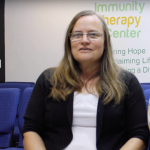Pancreatic Cancer
Medically Reviewed by: Dr. Bautista
Our Editorial Policy
Updated on: July 2, 2023
About Pancreatic Cancer
Pancreatic cancer typically originates in the tissues of your pancreas, an organ in your abdomen located behind the lower section of your stomach. When healthy, the pancreas:
-
- Releases hormones that manage blood sugar levels
- Releases enzymes meant to help digestion
Metastatic pancreatic cancer is when the cancer has spread to other areas of the body. Pancreatic cancer tends to metastasize into other local organs, such as the small intestines, liver, lungs, or even bones, prior to detection.
Types of Pancreatic Cancer
Though there are different types of pancreatic cancer, the most common is:
-
- Adenocarcinoma – More than 90% of all cases are pancreatic exocrine tumors that form in the cells lining the pancreatic duct (which connects to the common bile duct).
Rarer forms include:
-
- Acinar cell carcinoma – Pancreatic tumors that cause the pancreas to overproduce the fat digestion enzyme, lipase.
- Intraductal papillary-mucinous neoplasm (IPMN) – Pancreatic tumors that develop in the main pancreatic bile duct or in a side branch.
- Mucinous cystic neoplasm – A fluid-filled cyst that typically can be found predominantly in women, in the tail of the pancreas.
Causes and Risk Factors of Pancreatic Cancer
Like many other cancers, the exact reasons why pancreatic cancer cells occurs remains largely unknown. Despite that, there are risk factors that can alter the chances of someone developing it. Risk factors are:
-
- Smoking – One of the most critical contributors to pancreatic cancer. The risk for the disease is nearly two times as high for cigarette smokers when compared to non-smokers.
- Chronic pancreatitis – Long-term inflammation of the pancreas is linked to increased risks.
- Diabetes – Although associations have been found, the exact reasons remain murky.
- Family history of genetic syndromes or mutations – Inherited gene mutations or syndromes can contribute to rarer forms of pancreatic cancer.
- Family history of pancreatic cancer – If you have multiple family members with pancreatic cancer, your odds of also developing it are dramatically increased.
- Obesity – The World Cancer Research Fund estimates that 1 in 5 cancers are related to body fatness.
- Older age – Most people are diagnosed after age 65.
- Race – blacks are 25% more likely to develop it than other races.
According to Cancer.net, in 2019:
-
- Approximately 6,770 adults (29,940 men and 26,830 women) in the United States will receive a diagnosis for pancreatic cancer.
- Approximately 45,750 deaths (23,800 men and 21,950 women) will occur from the disease. So, although it is less common than many other forms of cancer, it’s more deadly.
The most likely patient to be diagnosed with pancreatic cancer would be a male in their mid-to-late 60s.
Early Detection, Diagnosis, and Staging
Signs and symptoms rarely manifest before the disease has progressed or metastasized elsewhere. Common symptoms are:
-
- Blood clots
- Depression
- Fatigue
- Jaundice
- Loss of appetite
- New-onset diabetes
- Pain in the upper abdomen that goes into your back
- Unintentional weight loss
Pancreatic Cancer Screening
Screening is typically done in one of four ways:
-
- Imaging tests – CT scans, MRIs, and PET scans.
- Endoscopic ultrasounds – Device is passed through your esophagus into your stomach.
- Biopsy – A sample of tissue is removed for analysis.
- Blood test – Test for specific proteins or tumor markers that pancreatic cancer cells typically shed.
Stages of Pancreatic Cancer
There are different stages of cancer, but at any stage you should seek some form of systematic therapy, treatment, surgical resection, or even available clinical trials. Staging depends on particulars related to each individual case for people with pancreatic tumor, but can be discussed generally:
-
- Stage I – The cancer cells or tumor are only in the pancreas. At the early stage, this is considered as resectable pancreatic cancer and which means itcan typically be removed via surgery.
- Stage II – The cancer has spread to nearby blood vessels and/or lymph nodes but has not yet spread to another organ.
- Stage III – The tumor has spread to major nearby arteries and/or lymph nodes, but hasn’t spread to another organ. At this stage, pancreatic tumors are unresectable, meaning they cannot be removed via surgery.
- Stage IV – The cancer has metastasized and spread to both local and distant organs. Typically, it will reach some combination of the lymph nodes, lungs, liver, and abdominal walls, making it difficult to find a good cancer treatment plan.
Individual cases of pancreatic cancer can differ in terms of survival rates, available therapy options, and participation in clinical trials. Visit our website or give us a call to find out which alternative treatment for pancreatic cancer is right for you or your loved one.
About Alternative/Natural Treatment of Pancreatic Cancer
Traditional treatments for pancreatic cancer patients usually involve targeted therapy such as chemotherapy, radiation therapy, or some form of surgery. While the effectiveness of treating pancreatic or other cancers with these treatments can vary, it is important to acknowledge that many of these traditional pancreatic cancer treatments come with various side effects that can leave you physically depleted with an already weakened immune system.
Immunity Therapy Center offers a wide range of alternative, natural treatments for Pancreatic cancer patients. Our alternative treatments offer natural methods to support your ongoing recovery while mitigating any potential negative side effects from traditional treatments. Our team is dedicated to creating a personalized treatment plan based on your health and cancer progression. At Immunity Therapy Center, the focus is on treating you as an individual, and the team strives to foster a positive relationship with you throughout the entire treatment process. If you are interested in exploring alternative treatment for pancreatic cancer with a customized cancer care plan or learning more about alternative therapy for Cancer Treatment reach out to Immunity Therapy Center today!
Sources
Cancer.net. Pancreatic Cancer: Statistics. https://www.cancer.net/cancer-types/pancreatic-cancer/statistics
Pandol, S. NCBI. The Burning Question: Why is Smoking a Risk Factor for Pancreatic Cancer? 2012. https://www.ncbi.nlm.nih.gov/pmc/articles/PMC3956306/
World Cancer Research Fund. Cancer Prevention Recommendations. https://www.wcrf.org/dietandcancer/recommendations-about
John Hopkins Medicine. Pancreatic Cancer and African Americans. https://pathology.jhu.edu/pc/NFPTR/AA.php
Pancreatic Cancer Action Network. Staging. https://www.pancan.org/facing-pancreatic-cancer/diagnosis/staging/
Therapies we useAt Immunity Therapy Center, our goal is to provide objective, updated, and research-based information on all health-related topics. This article is based on scientific research and/or other scientific articles. All information has been fact-checked and reviewed by Dr. Carlos Bautista, a Board Certified Medical Doctor at Immunity Therapy Center. All information published on the site must undergo an extensive review process to ensure accuracy. This article contains trusted sources with all references hyperlinked for the reader's visibility.
Customized Care For the Body And The Mind
Discuss Your Custom Alternative Treatment Plan With Our Team Today
Hear from Our Patients
See why the Immunity Therapy Center is a trusted name for medical tourism and cancer treatment centers in Mexico.




